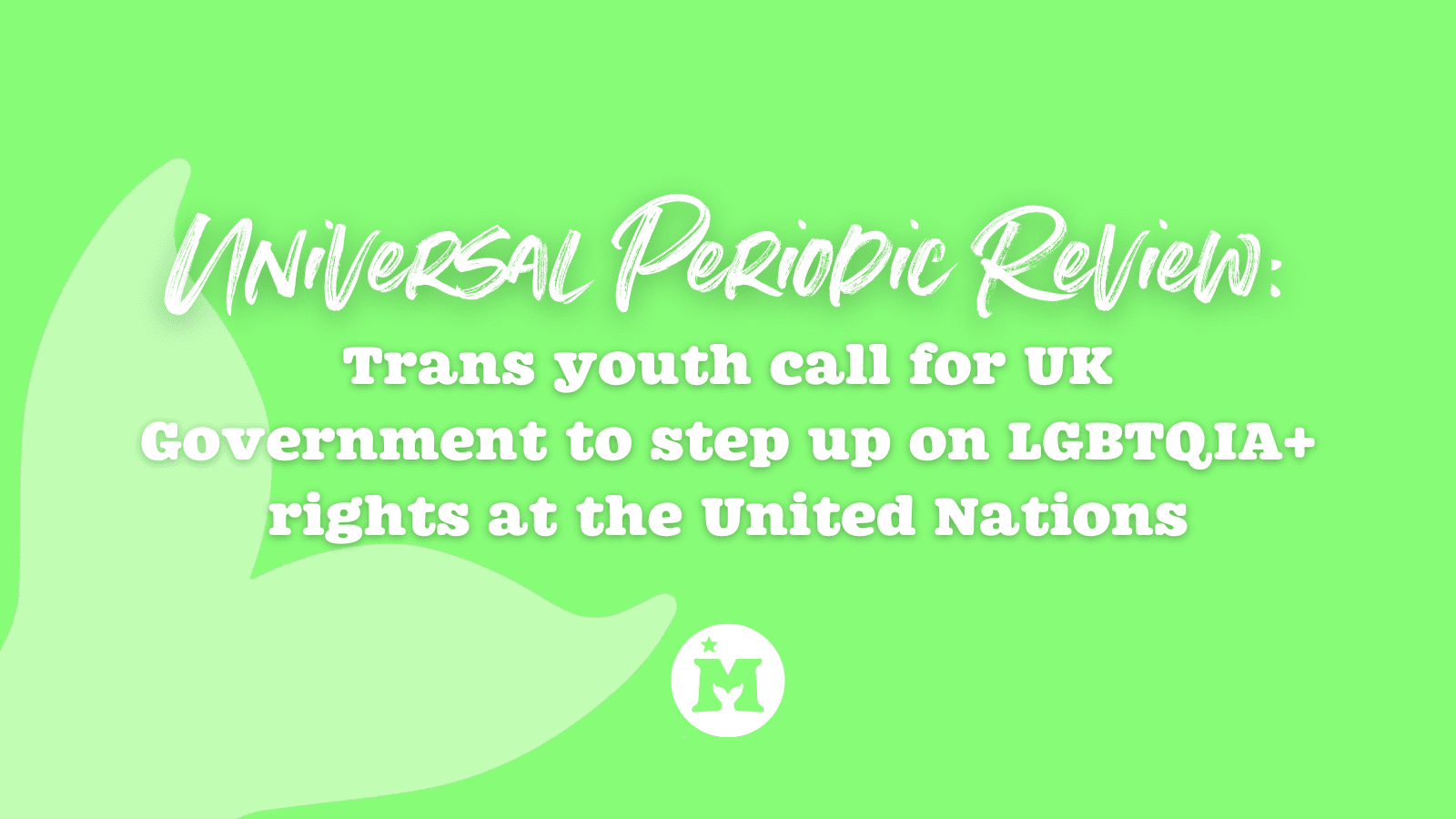
A member of Mermaids’ Youth Advisory Panel recently spoke at the United Nations (UN) Human Rights Council on the UK Government’s LGBTQIA+ rights record.
What’s happened and why does it matter?
Every four to five years, each UN Member State undergoes a review of their human rights record with other countries presenting their recommendations to the UK this year. The recommendations to the UK Government on LGBTQIA+ issues grew fivefold – especially on trans healthcare, legal recognition and banning conversion therapy.
What did Mermaids do?
Mermaids and Stonewall submitted evidence on the UK Government’s LGBTQIA+ rights record and presented our context and recommendations to UN representatives from dozens of countries in Geneva in August 2022.
We highlighted the lack of gender recognition reform, inaction on banning conversion practices, and inadequate access to gender-affirming healthcare for children and young people.
A trans young trans person, Ellie, also had the opportunity to speak to the United Nations. This is what they said about the experience:
It felt important to speak about the UK’s treatment of LGBTQIA+ people on such a prominent international platform.
As a trans young person in the UK, it has been frustrating to experience the government’s lack of action on the rights of LGBTQIA+ people.
Our government’s ignorance towards the challenges our community faces has allowed for an increase in hatred that must be addressed through policy change.
Transgender people deserve equal access to healthcare and to experience dignity in obtaining gender recognition. All LGBTQIA+ people in the UK deserve to feel protected and respected by their government.
While it was wonderful to have my voice heard, so many others do not have that privilege.
It is my hope that hearing a young person in the UN asking them to do better will remind the UK government who they represent, and will push them closer to making real change.
The statement also serves as a reminder to other Member States that the UK has a long way to go in their treatment of LGBTQIA+ people.”
What have other countries told the UK Government to do on LGBTQIA+ issues?
There were 17 recommendations given to the UK Government on LGBTQIA+ issues – a massive increase from three recommendations last time. They included recommendations to:
- Introduce a trans-inclusive ban on conversion therapy, from Malta, Iceland, Chile, Canada, Argentina and Israel
- To reform legal gender recognition, from Malta, Iceland, The Netherlands and Australia
- To fulfil the right to health of trans people, from Iceland
- To combat anti-LGBTQIA+ media and hate, from Iceland, Spain, Argentina and Uruguay
- To generally uphold and strengthen the legal protections for LGBTQIA+ people, especially trans people, from New Zealand
How did the UK Government respond?
Unfortunately, they rejected (‘noted’) the majority of recommendations – especially those relating to banning conversion practices (citing the promised upcoming legislation, which we’re still waiting on) or reforming gender recognition legislation. However, they did accept a critical recommendation from Iceland, to:
“Protect and fulfil the right to health of trans persons by increasing capacity and competence of gender identity health care services”
The UK Government’s failure to fulfil trans people’s right to timely and acceptable healthcare, as protected by the United Nations, will require substantial efforts and radical change if this promise can be kept before the next review.
They also accepted some general recommendations on preventing hate crime or upholding LGBTQIA+ legal protections, from Venezuela, Spain, Norway and New Zealand.
What’s next?
While the Universal Periodic Review process for the UK draws to a close, after over a year, the fight to protect trans rights in the UK continues in an increasingly hostile political and media climate. You can support our work by following us on social media and, if you’re able to do so, making a donation to help us give a voice to more young people like Ellie.
